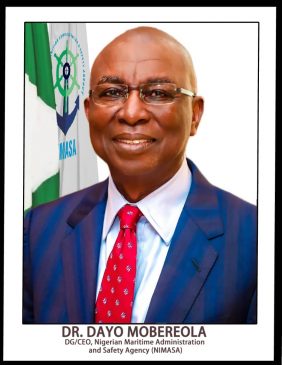Photo caption: Minister of Marine and Blue Economy, Adegboyega Oyetola

Photo caption: Director-General of NIMASA, Dr. Dayo Mobereola,
By Emeka Ugwuanyi
As part of efforts to harness the Blue Economy sector for sustainable growth and development in Nigeria, the Federal Ministry of Marine and Blue Economy is set to host a global workshop on Deep Seabed activities. This initiative is in collaboration with the Nigerian Maritime Administration and Safety Agency (NIMASA).
The Minister of Marine and Blue Economy, Adegboyega Oyetola, CON, stated that Nigeria’s hosting of the international workshop will help build in-country expertise by equipping policy makers and industry professionals with the knowledge and skills necessary to manage deep-sea resources sustainably.
“This workshop will offer hands-on training for Nigerian researchers and stakeholders, allowing them to engage directly with international experts and advanced technologies. Nigeria has vast ocean resources that are still largely unexplored and we have taken into consideration the recent extension of Nigeria’s continental shelf. I hope this workshop will provide a platform to launch the machinery to tap into these resources sustainably, balancing economic growth with environmental protection,” he said.
Oyetola added that the seminar would provide an opportunity for professionals and stakeholders in Nigeria’s maritime sector to collaborate with the Federal Government in harnessing the resources of the seas and oceans, while also creating jobs and wealth for the country.
The event, scheduled to take place in Abuja from September 17-18, 2024, will feature several presentations. These include “An Overview of the Deep Seabed: Prospects for the Blue Economy” by Dr. Dayo Mobereola, Director General of NIMASA, and “An Overview of the Extended Nigerian Continental Shelf Claim” by Surveyor Adamu Adaji, Director General of the National Boundary Commission (NBC), among other scholarly presentations.
The deep seabed lies beyond national jurisdiction, and the mineral resources located there are considered the common heritage of humanity. It covers more than 54 percent of the world’s oceans and presents a future source of mineral resources to support an increasing global population. Additionally, it addresses challenges related to accessing land-based deposits and provides the rare metals necessary to drive the future renewable economy.
Furthermore, the deep seabed plays a crucial role in mitigating climate change, which has a devastating impact on the sustainability of oceans and their resources. It is believed that the seabed contains a significant portion of the CO2 produced by human activities, thereby helping to absorb the excess heat generated by the greenhouse effect.



